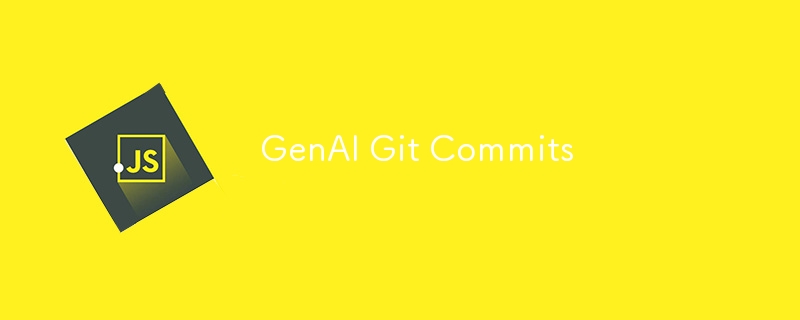

Generating a git commit message is quickly become a classic GenAI application for developers.
To help with this, we will craft a GenAIScript script.
The script acts as a regular node.js automation script and uses runPrompt
to issue calls to the LLM and ask the user to confirm the generated text.
The script begins by importing necessary functions from @inquirer/prompts:
import { select, input, confirm } from "@inquirer/prompts"
These functions will be used to interact with the user, asking them to confirm actions or input data.
Next, we check if there are any staged changes in the Git repository:
let { stdout } = await host.exec("git", ["diff", "--cached"])
If no changes are staged, we ask the user if they want to stage all changes. If the user confirms, we stage all changes. Otherwise, we bail out.
const stage = await confirm({
message: "No staged changes. Stage all changes?",
default: true,
})
if (stage) {
await host.exec("git", ["add", "."])
stdout = (await host.exec("git", ["diff", "--cached"])).stdout
}
if (!stdout) cancel("no staged changes")
We generate an initial commit message using the staged changes:
message = (
await runPrompt(
(_) => {
_.def("GIT_DIFF", stdout, { maxTokens: 20000 })
_.$`GIT_DIFF is a diff of all staged changes, coming from the command:
\`\`\`
git diff --cached
\`\`\`
Please generate a concise, one-line commit message for these changes.
- do NOT add quotes`
},
{ cache: false, temperature: 0.8 }
)
).text
The prompt configuration above indicates that the message should be concise,
related to the "git diff --cached" output, and should not include quotes.
User chooses how to proceed with the generated message:
choice = await select({
message,
choices: [
{ name: "commit", value: "commit", description: "accept message and commit" },
...
],
})
Options are given to edit or regenerate the message. If the user chooses to edit the message, we ask them to input a new message:
if (choice === "edit") {
message = await input({
message: "Edit commit message",
required: true,
})
choice = "commit"
}
If the user chooses to commit the message, we commit the changes:
if (choice === "commit" && message) {
console.log((await host.exec("git", ["commit", "-m", message])).stdout)
}
You can run this script using the CLI.
genaiscript run gcm
Since it uses the @inquirer/prompts package, you will need to install this package first:
npm install --save-dev @inquirer/prompts
If you are using npx,
npx -p @inquirer/prompts genaiscript -p genaiscript -- genaiscript run gcm
This command will run the script, and guide you through the process of generating and committing a Git message using AI, making your commits more informative and consistent.
You can wrap this command in a gcm.sh file or in your package script section in package.json:
{
"devDependencies": {
"@inquirer/prompts": "...",
"genaiscript": "..."
},
"scripts": {
"gcm": "genaiscript run gcm"
}
}
Then you can run the script using:
npm run gcm
This script was inspired from Karpathy's commit message generator.
Das obige ist der detaillierte Inhalt vonGenAI-Git-Commits. Für weitere Informationen folgen Sie bitte anderen verwandten Artikeln auf der PHP chinesischen Website!
 Vergleichsanalyse zwischen Win10 Home-Version und Professional-Version
Vergleichsanalyse zwischen Win10 Home-Version und Professional-Version
 Was bedeuten Zeichen in voller Breite?
Was bedeuten Zeichen in voller Breite?
 Verwendung des Linux-Komprimierungs-ZIP-Befehls
Verwendung des Linux-Komprimierungs-ZIP-Befehls
 So lesen Sie eine Spalte in Excel in Python
So lesen Sie eine Spalte in Excel in Python
 Bereinigen Sie den Müll in Win10
Bereinigen Sie den Müll in Win10
 Vor- und Nachteile des Flutter-Frameworks
Vor- und Nachteile des Flutter-Frameworks
 So verwenden Sie die Mid-Funktion
So verwenden Sie die Mid-Funktion
 So stellen Sie den IE-Browser wieder her, um automatisch zu EDGE zu springen
So stellen Sie den IE-Browser wieder her, um automatisch zu EDGE zu springen




